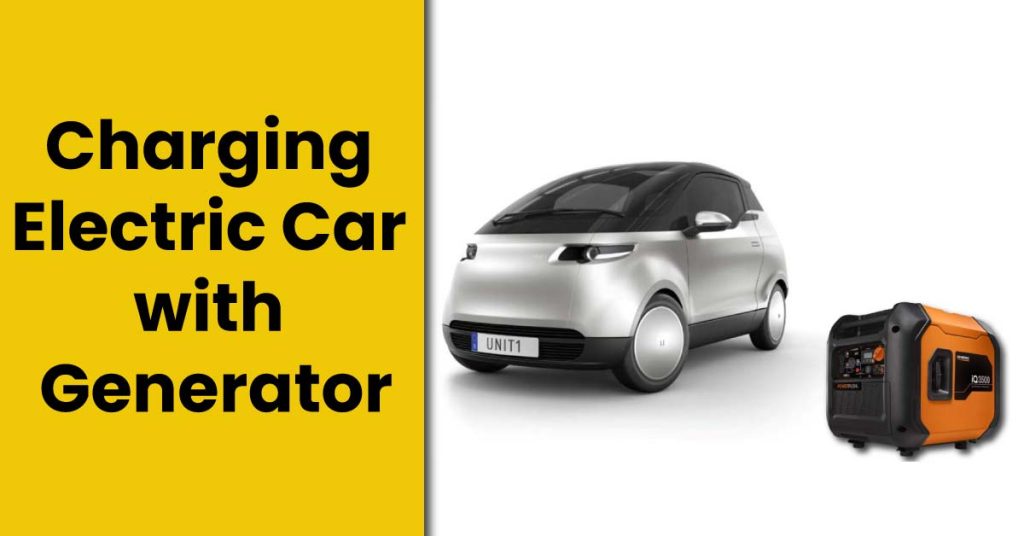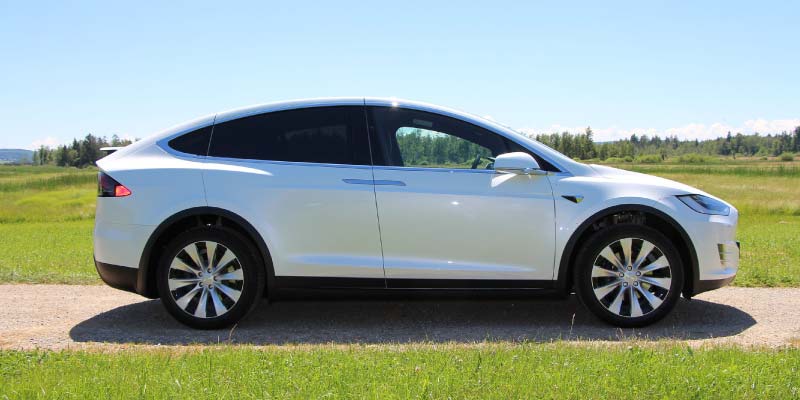Charging Electric Car with Generator – Level 1 & Level 2 EV Charging
In this article, I am going to tell you how to charge an EV car with a generator and is charging an electric car with a generator is practical or not.
Can A Generator Charge An Electric Car?
Yes. But, it depends on the type of generator, its power output, harmonic distortions, and the type of electric car you have. You also have to ground the generators to charge an EV.
We are experiencing historic growth in the electric vehicle market in the current era, but charging stations for electric cars are still not available in abundance like gas stations.
People like me who own an EV face the obstacle of charging these vehicles away from home and charging stations, and the worst nightmare of any EV owner is the power outage.
Power outages in most of the U.S. like California, are more frequent and prolonged than ever due to extreme weather caused by Global Warming.
But the good news is, portable generators can charge our level 1 and level 2 electrical vehicles during a power outage.
Why Small Portable Generators Are Not Good For Charging Electric Cars?
Portable generators are great for camping, charging small appliances, RVs, emergencies, and tailgating, but they are not good for EVs.
Even if you get the right adapters for Tesla or Chevy, the EVs will either not accept the power from the generator or they will charge at an extremely slow pace, which is not feasible.
So if you are determined to charge your EV using a portable generator instead of a whole house standby generator during a power outage, go for 7000 to 10000 watt generators like HONDA EU7000is.
How To Charge An Electric Car With A Generator?

So for the test, I am going to use my electric smart car and charge it at 120V with a Honda EU7000is generator.
The reason I am using HONDA EU7000is is that small portable generators are not good. They will struggle to produce more amps and watts, and most of them offer only 120V.
Most EV owners use HONDA or other high-power generators that offer 120V and 240V plugs.
I am using TESLA MODEL X and another smart car for the test.
LEVEL 1 CHARGING:
- For the level 1 charging, I use a standard 120V outlet. My smart car has a 17KWh battery.
- It means from empty, to full, this setup will take 10 hours to fully charge using a portable generator.
- Connect the charger to the generator, and let it run on ECO mode for a couple of seconds. Let the power build up, then connect the charger to the car.
- My smart EV car can do a level 2 charging (240V), but I don’t have the charger for that.
I would advise using a 240V plug for a quick charge. Otherwise, it would take a long time for the full charge, and it will consume a lot of fuel.
LEVEL 2 CHARGING FOR TESLA MODEL X:

Tesla has a much bigger battery and a sophisticated computer system. Don’t even try to power it using a small 1800 running watts generator. Either it won’t have the power from the generator, or it will charge at a snail’s pace.
First I am going to charge it using level 1 120V charging.
Now the cool thing about Tesla is you can adjust the amount of power that comes into the EV. Just like the smart car, Tesla is still accepting 127 volts, but we can increase the amps. So I went all the way up 16amps.
Now the problem is.
- At level 1, Tesla is going to take a lot longer to charge than a smart car, because my car has a 17KWh battery, and the Tesla has a 100KW battery.
- The charging speed is 1.8KW, divide it by 100KWh and it will 55.55 hours to fully charge from empty.
Now time for the 240V charging (level 2). Tesla does provide its charger along with 110.
So I am going to jump from 1.8KW to 4KW. I cranked it up to 247V and 20amps which is about 4940 watts.
The car has a 100KWh battery and we are pulling about 4.9KW (100/4.9). So from empty to full, it will take 20.4 hours.
Is Charging Electric Car With Generator Practical?
So overall, you can charge your electrical vehicles with a powerful portable generator, but it will take a long time. It is not that practical.
This solution is only practical in emergencies. But who is buying a generator only for electric cars anyways?
Most people including me purchase portable generators for camping, RVs, tailgating, and emergencies in case of power outages.
Here is the guide to charge an RV battery with a generator
Use Standby Generator For Charging An Electric Car
To properly and quickly charge an electric vehicle, you need a generator that can produce 10KW or more clean power, especially for level 2 charging.
Standby generators are designed to produce 10KW or higher power to run power-hungry appliances like a refrigerator, AC, sump pumps, etc. if your home has a standby generator as an emergency backup, you might be able to charge your electric vehicle quicker than a portable generator.

Alex Black is a seasoned electrical engineer with a remarkable 8-year track record specializing in appliances, generators, and transfer switches. With extensive hands-on experience in the field, Alex possesses a deep understanding of electrical systems and their intricate workings. Throughout their career, Alex has consistently demonstrated expertise in designing, troubleshooting, and maintaining various electrical appliances.

Good day Freddie,
I was trying to charge our ionic 5 with a Yamaha 2000 W inverter just to see if it would take the charge but the car would continually go into fault mode. I see at the beginning of your article it says you need to ground the generator maybe that was the problem? How do I do that? Thanks for the article and any information. I do have larger generators but I was just trying without one to start with. I was honestly hoping to have a small trailer with a diesel generator for long trips and I can convert diesels to run on cooking oil which I put many miles on my diesel truck that way and it would be nice for long trips but you cannot ground a generator if it’s home wheels. I love the idea of this because used cooking oil is free and better than burning diesel or gasoline when we don’t want to stop to just fast charge. I guess that idea is out the window ?
Cheers,
Paul
705 989 7285
Hey Paul Wynia,
I am extremely sorry for the late reply. It must have slipped from my mind.
You can check this article (https://www.generatorpriest.com/how-to-ground-a-generator/) if you know about ground a generator.
And yeah, why don’t you try a 3000W solar generator instead of a diesel generator?
What size generator you have?
Great information, I love your site. I have a 15 KW portable generator. Would that be strong enough to Charge a vehicle stuck on the side of the road to get it going to the next available charger?
Hello Bill,
Can you tell me the model of the generator?
Cheers mate.